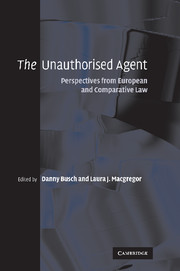Foreword
Published online by Cambridge University Press: 07 September 2009
Summary
If A, purporting to act as the agent of a principal (P), makes a contract with a third party (TP) on behalf of P but without the authority of P, what are the legal consequences for TP, and P, and A? That is the problem lying at the heart of this book.
Needless to say, the answer depends on the facts and on the legal system within which the questions are asked. It may matter whether P has put forward A as his agent, or whether he has ratified A's unauthorised conduct. It may be relevant whether A is himself liable. These are the specific issues the authors have chosen to address.
This is a model comparative study, for two reasons in particular. First, the editors have cast their net widely, embracing four civilian legal systems (those of France, Belgium, Germany and the Netherlands), two common law systems (England and the United States), two mixed legal systems (Scotland and South Africa) and two international legal models (The Principles of European Contract Law and the UNIDROIT Principles of International Commercial Contracts). The breadth of this coverage makes for an unusually illuminating comparison. But, secondly, the editors and the authors have co-operated to concentrate on the topics chosen for attention, giving an intensity of focus which would be lost if the authors had embarked on more general expositions of the law of agency under the various systems considered.
- Type
- Chapter
- Information
- The Unauthorised AgentPerspectives from European and Comparative Law, pp. ix - xPublisher: Cambridge University PressPrint publication year: 2009



